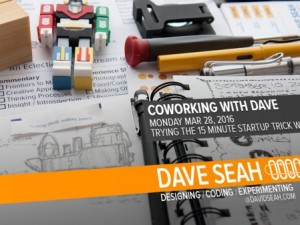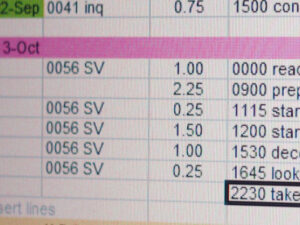(last edited on February 15, 2023 at 12:26 pm)
I stumbled upon a phrase “Action Precedes Motivation” sometime during my wanderings of the Internet yesterday, and sufficiently intrigued by its truthiness to dig a little deeper. I found this longer quote online:
“The common conception is that motivation leads to action, but the reverse is true — action precedes motivation. You have to ”prime the pump” and get the juice flowing, which motivates you to work on your goals. Getting momentum going is the most difficult part of the job, and often taking the first step is enough to prompt you to make the best of your day.” – Robert J. McKain
I have to admit that for me, motivation is hard to summon even when I’m 100% certain of an action’s benefits. I’ve spent quite a number of years trying to train myself to self-motivate in the face of the unknown. My best trick so far is to allocate 5 to 15 minutes to the action, giving myself permission to give up after that time has elapsed. Just about every time I do this, I find that I’m likely to keep going; it is starting itself that is difficult, and once that hurdle is overcome I find I can be quite productive. What I find so interesting about the notion of action preceding motivation is that (1) it does seem to work for me as I’ve described and (2) it hints at a different model for understanding how my intentions, actions, and motivation are connected. Ideally, I’d like to more easily move from intention to productive action in my everyday work, particularly for my own personal projects. Being a solo entrepreneur working in isolation, being able to crack this nut is of critical importance to future productivity.
Motivation and Volition
As far as I can tell, Robert J. McKain wrote a couple of books in the late 70s/early 80s on the topic of self improvement. When I get back to the States I’ll order a copy of one of his books and see if there are useful citations in them.
I did a quick browse of Wikipedia’s article on motivation, but nothing really popped-out at me other than the word volition, which is the psychological term for willpower; that is “the cognitive process by which an individual decides on and commits to a particular course of action.” I had not considered that motivation might itself be further decomposed. For example, one study mentioned seems to suggest that the level of desire determines the different; once a certain threshold of desire is reached, then motivation (the drive) becomes volition (the active pursuit).
Theory of my Mind
When I apply the idea that there’s a separation between the desire to do something (motivation) and the active pursuit thereof (volition) to my own situation, I’m reminded of another confounding separation within my mind: implicit trust of one’s inner voice versus rational assessment of the self relative to the world. I don’t know what field governs this area of speculation, so I’ll just describe what these terms mean to me.
Implicit Trust of One’s Inner Voice – When I am thinking my thoughts and feeling my feelings, my instinct is to trust that I am telling myself the truth. This is particularly true when I am thinking about my preferences/aversions regarding certain situations, simple stuff like “I like cheese” and, “I don’t like shrimp.” It takes mental training AND toughness to challenge one’s own assumptions to become a stronger individual, but even then the more nebulous feelings—I am uncomfortable. I feel exposed. I am not in control—tend to color our thoughts without question. Paulo Coelho’s excellent book The Alchemist has a particularly wonderful observation about about the noisiness of our fearful hearts toward the end of the book, the gist of which is that we need to listen to them but not let them keep rule us. A lot of people, myself included, will listen to their heart when they are agitated and afraid, transforming that energy into negativity. The most dramatic version of this is acting out of fear. The more common version is NOT acting because we *rationalize that fear into some other response.
Rational Assessment of the Self relative to the World – There are certain desires I have. There are goals and the means to achieve them that I have defined and researches. There are also hundreds of facts about the world that I’ve absorbed in my decades of being alive, all of which can help me achieve my desires as well as select new ones when the moment calls for it. In theory, I have the means and the ability to move in ANY DIRECTION I IMAGINE. I’m smart enough and capable enough. It’s quite exciting.
When I think of myself as an individual “Dave” with the power to dream and do anything I can conceive of, I don’t always make the distinction between the above “inner voice” and my “rational thought processes”, but I know being able to do so is a useful skill. Indeed, one of the big challenges of self improvement is in acknowledging the well-intentioned self-preserving fear that bubbles-up from our hearts while nevertheless crafting a rational strategy that has a high percentage of success. This is a kind of balance between emotion and reason, which has the side-effect of nullifying fear. A blunt-but-effective rule of thumb that works for me is to ask the question will pursuing this action result in actual death? How exactly? Most of the time, the answer is NO, and even if there is the possibility of failure, forcing myself to name it exactly has the effect of disempowering ill-defined fears. “Something bad might happen” is not a good-enough reason to dissuade me from doing something. “You are not trained in hand-to-hand combat” is a much better, more specific reason. And it’s a reason that offers its own solution.
My Sense of Self, Remodeled
After all that, let me get back to the notion of my inner voice being separate from my rational thought processes. My inner voice—the collections of thoughts and emotions that I can clearly follow in my head—is the foundation of my sense of self or ME, and the prevailing assumption we have is that we can trust our own thoughts. When I find myself incapable of resolving some puzzle in my head through rational or emotional means, I have to talk it through with myself (perhaps with the help of others) and resolve it internally. That’s how we like it, right? We don’t like lingering self-doubt or internal conflict. It’s probably 100% necessary to trust one’s own inner voice to feel any semblance of peace.
THAT SAID…
When one thinks of being self-motivated, what exactly do we mean by “the self”? My first inclination is to say that it’s my inner voice, that bundle of thoughts strongly correlated with feelings that is at the root of my sense of self. It occurs to me, having read McKain’s quote on action preceding motivation, that my inner voice is not qualified to be in charge.
The model I previously had for motivation was as McKain describes as inaccurate: first come motivation, then comes action. My inner voice is great at expressing desire and figuring out how to relate that desire to action, but it’s really terrible at initiating action. That’s because my inner voice is driven by emotion, not logic or reason, which is likely just the way my personality works. I happen to enjoy reason and logic, but only in the service of producing satisfying emotional experiences for myself or with other people. I don’t derive joy from rational achievement. Tastes like cardboard! But when I use rational achievements to support a creamy emotional center, I end up with a great sandwich. That’s what I like.
But another way, my inner voice is not great at synthesizing action because it’s triggered by emotion. Therefore, I have been expecting the motivation trigger to be in the form of “feeling like starting”, which happens very rarely and under certain conditions that I’ve cataloged before. The result is inaction.
McKain’s insight that action precedes motivation gives me a foundation for understanding another starting trick I’ve used, which was to kill all emotion like a robot when I had the work in front of me. Some days it’s the only way to get started on difficult programming work, and it feels like I am killing part of myself every time I do it. And I suppose I am…I am disabling my inner voice, normally a happy and bubbly creature that runs around the meadowlands of my imagination, and let the normally-subservient rational side take control. A similar thing happens on days when I’m finding it hard to get out of bed: I turn off my brain and then my physical body seems to just take control and I’m in the shower.
This is one of the more interesting insights I’ve had about myself in some time, and I’m curious how it plays into my work when I get back to the States. It seems like I now have three different kinds of brains I can put into service:
- Physical Brain – The one where my body just does physical things like move around and exercise. The one that wants to get out of bed and be outside in the real world. It doesn’t get used that much.
- Feeling Brain – The one that I think most of being “me”, inquisitive and not very disciplined about exploring, looking for connections between things and people that produce feelings of cheer. Good for explorative design work, writing.
- Rational Brain – The one that appreciates process, organization, and things fitting together just right according to standards. It infers hidden connections and uncovers them with additional research. Good for programming, documentation, doing tedious-but-necessary chores that build success
Each brain drives a different kind of process, and picking the correct one for a given scenario might be the key to unlocking my volition to act. No longer is it an act of “killing part of me”, which feels as awful as it sounds so I resist it. Instead, it’s like putting on a different kind of fancy hat, and who hates fancy hats? NOT ME (though I still haven’t found a real hat that looks good on my round melon of a head).
That’s the theory. Whether being a three-headed Dave works as an effective means to be more productive remains to be seen! :)





3 Comments
I think it can work both ways. There are times where action does precede motivation. For example, if I have an arduous or monotonous task to do, I have to power through it. If I see results, motivation takes over. Then there are times when I get really excited about things and am keyed in and fully motivated. Action then supersedes motivation.
Thoughts?
Steve: Oh, certainly it can work both ways, I entirely agree. I’m interested in a specific case when I’m unable to initiate action on boring or uncertain rewards-type tasks if I know they’re going to be that way ahead of time. Those happen to be the tasks I should make more progress on. I’m actually experiencing a bout of the blahs right this moment, and what’s interesting is that I’m unable to even form a list of things to do. This is some heavier resistance than I expected today. It’s possible that this mental cloudiness I’m feeling is due to not having slept enough, or I am a bit dehydrated.
You might want to read mini habits by Stephen Guise. It’s a short book that explains very well and in few pages the physiological reasons for the resistance, and how natural is that most times we feel like not doing something. Action precedes motivation and his book has provided not only validation to my feelings but a method to tackle my resistance with gentleness. I like how self aware you are, without having all the science you pretty much explained the way it works. In your comment you mentioned dehydration or lack of sleep, the science points to low glucose level as of the 5 reasons for your willpower depletion. Take care.